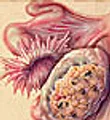ByBrenda Goodman, MA
WebMD Health News Reviewed byLouise Chang, MD

Dec. 5, 2012 -- Doubling the time that breast cancer patients take tamoxifen cuts the risk that the cancer will come back and further lowers the risk of dying of the disease, a new study shows.
The study is expected to change the way doctors prescribe tamoxifen, a drug that blocks the effects of estrogen on breast cells. About 80% of all breast cancers are sensitive to the hormone estrogen for growth.
The research also hints that longer courses of other kinds of hormone-reducing medications may also work better than shorter courses after breast cancer surgery, though trials testing that theory are ongoing.
“I think the result of this trial will have a major immediate impact on premenopausal women,” says Peter Ravdin, MD, PhD. Ravdin is the director of the Breast Health Clinic at the Cancer Therapy and Research Center at the University of Texas Health Science Center, in San Antonio.
Newer kinds of estrogen-reducing drugs, called aromatase inhibitors, have largely replaced tamoxifen as the preferred therapy for postmenopausal women with estrogen-sensitive cancers. This study won’t change that.
But those kinds of drugs don’t work for women before menopause. For them, doctors still recommend taking tamoxifen.
Current guidelines recommend that women stop tamoxifen after five years because the drug increases the risk of uterine cancers and dangerous blood clots.
The new study found small increases in cases of uterine cancer in women who took the drug for an additional five years. Those women also had slightly higher risks of developing a blood clot in their lungs. But those additional risks did not appear to outweigh the survival benefits of staying on the drug.
“I think that for women who are now approaching five years of therapy, where we’d usually be telling them -- up to this point -- that we’re going to be stopping the tamoxifen, now we’re going to be telling them that there is clinical evidence that 10 years is superior to five years, and I’m going to be comfortable doing that,” says Ravdin, who led a news briefing on the study but was not involved in the research.
The study was published in the Lancet and presented to doctors at the 2012 San Antonio Breast Cancer Symposium.
A Visual Guide to Breast Cancer
1 | 2 | 3 Next Page > #url_reference {display: none};#url_reference { display: block; line-height: 150%; margin-bottom: 10px; }#logo_rdr img { visibility: visible; }.titleBar_rdr .titleBarMiddle_fmt { padding-top: 1.5em !important;} Top Picks When to Get a Screening Mammogram Slideshow: Stress-Reducing Foods Health Check: Breast Cancer Treatment Options Breast Cancer's Link to Bone Metastasis Suspicious Mammogram Result: Now What? 7 Tips to Quit Smoking for Good Breast Cancer Home News Reference Videos Community Questions and Answers Glossary Medications

Breast Cancer Guide 1 Overview & Facts 2 Symptoms & Types 3 Diagnosis & Tests 4 Treatment & Care 5 Living & Managing 6 Support & Resources See what others are asking about
Visit WebMD Answers
Related to Breast Cancer Breast Cancer Screening Breast Problems Breast Reconstruction Surgery Cervical Cancer Clinical Trials Hair Loss Living Healthy Ovarian Cancer Women’s Health More Related Topics Today in Breast Cancer

HEALTH CHECK Dealing With Breast Cancer?

SLIDESHOW Breast Cancer: Symptoms and Treatments

SLIDESHOW Top Cancer-Fighting Foods

Article Can Estrogen Lower Breast Cancer Risk? .answers_promo_slide {background:#fff;position:fixed;bottom: 0px;display:none;right:-510px;width:510px;z-index:9999;}* html div.answers_promo_slide { position: absolute; }.answers_promo_slide .top {background:url('http://img.webmd.com/dtmcms/live/webmd/consumer_assets/site_images/modules/answers_slide_top_bot.png') top left repeat-x;font-size:1%;height:33px;}.answers_promo_slide .top .left {float:left;height:33px;width:33px;}.answers_promo_slide .bot {background:url('http://img.webmd.com/dtmcms/live/webmd/consumer_assets/site_images/modules/answers_slide_top_bot.png') bottom left repeat-x;font-size:1%;height:20;}.answers_promo_slide .bot .left {background:url('http://img.webmd.com/dtmcms/live/webmd/consumer_assets/site_images/modules/answers_slide_corner.png') bottom left no-repeat;height:20px;width:20px;}.answers_promo_slide .top a {background:url('http://img.webmd.com/dtmcms/live/webmd/consumer_assets/site_images/modules/answers_slide_corner.png') top right no-repeat;display:block;height:33px;text-indent:-5000px;width:33px;}.answers_promo_slide .top a span {text-indent:-5000px;}.answers_promo_slide .content {background:url('http://img.webmd.com/dtmcms/live/webmd/consumer_assets/site_images/modules/answers_slide_bg.png') top left repeat-y;clear:both;padding-bottom:15px;}.answers_promo_slide h3 {display:inline;float:left;margin:0 0 0 20px;width:208px;height:50px;}.answers_promo_slide h3 a {background:url('http://img.webmd.com/dtmcms/live/webmd/consumer_assets/site_images/modules/answers_mod_logo.png') no-repeat;display:block;width:208px;height:50px;text-indent:-5000px;}.answers_promo_slide h3 span {text-indent:-5000px;}.answers_promo_slide ul {clear:both;margin:10px 0 0 20px;padding:0;list-style:none;}.answers_promo_slide li {line-height:18px;}.answers_promo_slide form.qasearch {float:left;position: relative;margin:-10px 0 0 10px;padding:0;width:270px;}.answers_promo_slide form.qasearch label {color: #5E9EBE;display: none;font-size: 110%;height: 20px;left: 5px;position: absolute;top: 32px;width: 190px;}.answers_promo_slide form.qasearch fieldset {border: none;margin: 0;padding: 0;}.answers_promo_slide form.qasearch fieldset legend {color:#333;display:block;font-size:125%;font-weight:normal;margin:0;padding:2px 0 0 0;}* html .answers_promo_slide form.qasearch fieldset legend {margin-left:-6px;}*+html .answers_promo_slide form.qasearch fieldset legend {margin-left:-6px;}.answers_promo_slide form.qasearch input.question {height: 20px;width: 190px;font-size: 110%;color: #5e9ebe;float: left;margin: 5px 10px 0 0;position: relative;}.answers_promo_slide form.qasearch input.asknow {background: url('http://img.webmd.com/dtmcms/live/webmd/consumer_assets/site_images/modules/btn_ask.png') 0 0px no-repeat;border:0 none;cursor:pointer;display:block;float:left;font-size:0;height:25px;line-height:0;margin:5px 0 0;text-indent:-5000px;width:42px;} Close WebMD AnswersMore breast cancer questions?Ask Your QuestionWhat is breast cancer?Who is at risk for breast cancer?What should I know about breast reconstruction after breast cancer?

VIDEO Breast Cancer Treatments Improving

SLIDESHOW Quit-Smoking Tips for the First Hard Days

Article Mammogram Screening Guidelines

SLIDESHOW Essential Screenings for Every Woman

SLIDESHOW Ovarian Cancer: a Visual Guide

Article Breast Cancer: Steps to Reduce Your Risk

HEALTH CHECK What Is Your Cancer Risk?

SLIDESHOW Reduce Stress and Revitalize Your Life Subscribe to WebMD Newsletters WebMD Daily Women's Health Men's Health Weight Loss Wisdom I have read and agree to WebMD's Privacy Policy. Submit Sign up for more topics! WebMD Special Sections How to Perform a Breast Self-Exam Health Solutions From Our Sponsors Vaccine Questions? Low Testosterone? Bipolar Disorder Facts Birth Control for Moms Blood Sugar Control Bent Fingers? Diagnosed With Low T? Fibromyalgia & Exercise Depression & Adults Child with Diabetes? Vaccines for All Ages Knee Pain Relief Itchy, Scaly Skin? Hearing Aid Alternative Relapsing MS Help In-depth coverage: Psoriasis Treatment on Target?|Healthy Mouth Help|RA Assessment|Living Healthy Guide|Family & Pregnancy Toolbox|Check Your Heartburn Symptoms Find us on:URAC: Accredited Health Web Site

HonCode: Health on the Net FoundationAdChoicesAbout WebMD Advertise With Us Terms of Use Privacy Policy Sponsor Policy Site Map Careers Contact UsMedscape Reference eMedicineHealth RxList Medscape MedicineNet BootsWebMD WebMD CorporateMedical Dictionary-->First Aid WebMD Magazine WebMD Health Record WebMD Mobile Newsletters Dictionary Physician Directory
©2005-2012 WebMD, LLC. All rights reserved.
WebMD does not provide medical advice, diagnosis or treatment. See additional information.
View the
Original article









 HEALTH CHECK Dealing With Breast Cancer?
HEALTH CHECK Dealing With Breast Cancer?  SLIDESHOW Breast Cancer: Symptoms and Treatments
SLIDESHOW Breast Cancer: Symptoms and Treatments  SLIDESHOW Top Cancer-Fighting Foods
SLIDESHOW Top Cancer-Fighting Foods  Article Can Estrogen Lower Breast Cancer Risk? .answers_promo_slide {background:#fff;position:fixed;bottom: 0px;display:none;right:-510px;width:510px;z-index:9999;}* html div.answers_promo_slide { position: absolute; }.answers_promo_slide .top {background:url('http://img.webmd.com/dtmcms/live/webmd/consumer_assets/site_images/modules/answers_slide_top_bot.png') top left repeat-x;font-size:1%;height:33px;}.answers_promo_slide .top .left {float:left;height:33px;width:33px;}.answers_promo_slide .bot {background:url('http://img.webmd.com/dtmcms/live/webmd/consumer_assets/site_images/modules/answers_slide_top_bot.png') bottom left repeat-x;font-size:1%;height:20;}.answers_promo_slide .bot .left {background:url('http://img.webmd.com/dtmcms/live/webmd/consumer_assets/site_images/modules/answers_slide_corner.png') bottom left no-repeat;height:20px;width:20px;}.answers_promo_slide .top a {background:url('http://img.webmd.com/dtmcms/live/webmd/consumer_assets/site_images/modules/answers_slide_corner.png') top right no-repeat;display:block;height:33px;text-indent:-5000px;width:33px;}.answers_promo_slide .top a span {text-indent:-5000px;}.answers_promo_slide .content {background:url('http://img.webmd.com/dtmcms/live/webmd/consumer_assets/site_images/modules/answers_slide_bg.png') top left repeat-y;clear:both;padding-bottom:15px;}.answers_promo_slide h3 {display:inline;float:left;margin:0 0 0 20px;width:208px;height:50px;}.answers_promo_slide h3 a {background:url('http://img.webmd.com/dtmcms/live/webmd/consumer_assets/site_images/modules/answers_mod_logo.png') no-repeat;display:block;width:208px;height:50px;text-indent:-5000px;}.answers_promo_slide h3 span {text-indent:-5000px;}.answers_promo_slide ul {clear:both;margin:10px 0 0 20px;padding:0;list-style:none;}.answers_promo_slide li {line-height:18px;}.answers_promo_slide form.qasearch {float:left;position: relative;margin:-10px 0 0 10px;padding:0;width:270px;}.answers_promo_slide form.qasearch label {color: #5E9EBE;display: none;font-size: 110%;height: 20px;left: 5px;position: absolute;top: 32px;width: 190px;}.answers_promo_slide form.qasearch fieldset {border: none;margin: 0;padding: 0;}.answers_promo_slide form.qasearch fieldset legend {color:#333;display:block;font-size:125%;font-weight:normal;margin:0;padding:2px 0 0 0;}* html .answers_promo_slide form.qasearch fieldset legend {margin-left:-6px;}*+html .answers_promo_slide form.qasearch fieldset legend {margin-left:-6px;}.answers_promo_slide form.qasearch input.question {height: 20px;width: 190px;font-size: 110%;color: #5e9ebe;float: left;margin: 5px 10px 0 0;position: relative;}.answers_promo_slide form.qasearch input.asknow {background: url('http://img.webmd.com/dtmcms/live/webmd/consumer_assets/site_images/modules/btn_ask.png') 0 0px no-repeat;border:0 none;cursor:pointer;display:block;float:left;font-size:0;height:25px;line-height:0;margin:5px 0 0;text-indent:-5000px;width:42px;} Close WebMD AnswersMore breast cancer questions?Ask Your QuestionWhat is breast cancer?Who is at risk for breast cancer?What should I know about breast reconstruction after breast cancer?
Article Can Estrogen Lower Breast Cancer Risk? .answers_promo_slide {background:#fff;position:fixed;bottom: 0px;display:none;right:-510px;width:510px;z-index:9999;}* html div.answers_promo_slide { position: absolute; }.answers_promo_slide .top {background:url('http://img.webmd.com/dtmcms/live/webmd/consumer_assets/site_images/modules/answers_slide_top_bot.png') top left repeat-x;font-size:1%;height:33px;}.answers_promo_slide .top .left {float:left;height:33px;width:33px;}.answers_promo_slide .bot {background:url('http://img.webmd.com/dtmcms/live/webmd/consumer_assets/site_images/modules/answers_slide_top_bot.png') bottom left repeat-x;font-size:1%;height:20;}.answers_promo_slide .bot .left {background:url('http://img.webmd.com/dtmcms/live/webmd/consumer_assets/site_images/modules/answers_slide_corner.png') bottom left no-repeat;height:20px;width:20px;}.answers_promo_slide .top a {background:url('http://img.webmd.com/dtmcms/live/webmd/consumer_assets/site_images/modules/answers_slide_corner.png') top right no-repeat;display:block;height:33px;text-indent:-5000px;width:33px;}.answers_promo_slide .top a span {text-indent:-5000px;}.answers_promo_slide .content {background:url('http://img.webmd.com/dtmcms/live/webmd/consumer_assets/site_images/modules/answers_slide_bg.png') top left repeat-y;clear:both;padding-bottom:15px;}.answers_promo_slide h3 {display:inline;float:left;margin:0 0 0 20px;width:208px;height:50px;}.answers_promo_slide h3 a {background:url('http://img.webmd.com/dtmcms/live/webmd/consumer_assets/site_images/modules/answers_mod_logo.png') no-repeat;display:block;width:208px;height:50px;text-indent:-5000px;}.answers_promo_slide h3 span {text-indent:-5000px;}.answers_promo_slide ul {clear:both;margin:10px 0 0 20px;padding:0;list-style:none;}.answers_promo_slide li {line-height:18px;}.answers_promo_slide form.qasearch {float:left;position: relative;margin:-10px 0 0 10px;padding:0;width:270px;}.answers_promo_slide form.qasearch label {color: #5E9EBE;display: none;font-size: 110%;height: 20px;left: 5px;position: absolute;top: 32px;width: 190px;}.answers_promo_slide form.qasearch fieldset {border: none;margin: 0;padding: 0;}.answers_promo_slide form.qasearch fieldset legend {color:#333;display:block;font-size:125%;font-weight:normal;margin:0;padding:2px 0 0 0;}* html .answers_promo_slide form.qasearch fieldset legend {margin-left:-6px;}*+html .answers_promo_slide form.qasearch fieldset legend {margin-left:-6px;}.answers_promo_slide form.qasearch input.question {height: 20px;width: 190px;font-size: 110%;color: #5e9ebe;float: left;margin: 5px 10px 0 0;position: relative;}.answers_promo_slide form.qasearch input.asknow {background: url('http://img.webmd.com/dtmcms/live/webmd/consumer_assets/site_images/modules/btn_ask.png') 0 0px no-repeat;border:0 none;cursor:pointer;display:block;float:left;font-size:0;height:25px;line-height:0;margin:5px 0 0;text-indent:-5000px;width:42px;} Close WebMD AnswersMore breast cancer questions?Ask Your QuestionWhat is breast cancer?Who is at risk for breast cancer?What should I know about breast reconstruction after breast cancer?  VIDEO Breast Cancer Treatments Improving
VIDEO Breast Cancer Treatments Improving  SLIDESHOW Quit-Smoking Tips for the First Hard Days
SLIDESHOW Quit-Smoking Tips for the First Hard Days  Article Mammogram Screening Guidelines
Article Mammogram Screening Guidelines  SLIDESHOW Essential Screenings for Every Woman
SLIDESHOW Essential Screenings for Every Woman  SLIDESHOW Ovarian Cancer: a Visual Guide
SLIDESHOW Ovarian Cancer: a Visual Guide  Article Breast Cancer: Steps to Reduce Your Risk
Article Breast Cancer: Steps to Reduce Your Risk  HEALTH CHECK What Is Your Cancer Risk?
HEALTH CHECK What Is Your Cancer Risk?  SLIDESHOW Reduce Stress and Revitalize Your Life Subscribe to WebMD Newsletters WebMD Daily Women's Health Men's Health Weight Loss Wisdom I have read and agree to WebMD's Privacy Policy. Submit Sign up for more topics! WebMD Special Sections How to Perform a Breast Self-Exam Health Solutions From Our Sponsors Vaccine Questions? Low Testosterone? Bipolar Disorder Facts Birth Control for Moms Blood Sugar Control Bent Fingers? Diagnosed With Low T? Fibromyalgia & Exercise Depression & Adults Child with Diabetes? Vaccines for All Ages Knee Pain Relief Itchy, Scaly Skin? Hearing Aid Alternative Relapsing MS Help In-depth coverage: Psoriasis Treatment on Target?|Healthy Mouth Help|RA Assessment|Living Healthy Guide|Family & Pregnancy Toolbox|Check Your Heartburn Symptoms Find us on:URAC: Accredited Health Web Site
SLIDESHOW Reduce Stress and Revitalize Your Life Subscribe to WebMD Newsletters WebMD Daily Women's Health Men's Health Weight Loss Wisdom I have read and agree to WebMD's Privacy Policy. Submit Sign up for more topics! WebMD Special Sections How to Perform a Breast Self-Exam Health Solutions From Our Sponsors Vaccine Questions? Low Testosterone? Bipolar Disorder Facts Birth Control for Moms Blood Sugar Control Bent Fingers? Diagnosed With Low T? Fibromyalgia & Exercise Depression & Adults Child with Diabetes? Vaccines for All Ages Knee Pain Relief Itchy, Scaly Skin? Hearing Aid Alternative Relapsing MS Help In-depth coverage: Psoriasis Treatment on Target?|Healthy Mouth Help|RA Assessment|Living Healthy Guide|Family & Pregnancy Toolbox|Check Your Heartburn Symptoms Find us on:URAC: Accredited Health Web Site